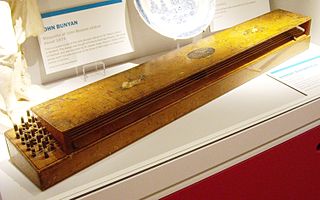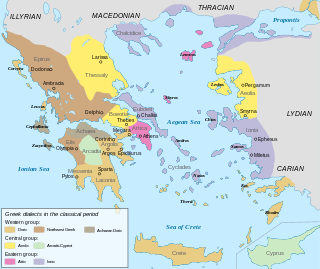In Greek mythology, Aeolus or Aiolos is a name shared by three mythical characters. These three personages are often difficult to tell apart, and even the ancient mythographers appear to have been perplexed about which Aeolus was which. Diodorus Siculus made an attempt to define each of these three, and his opinion is followed here.

The Aeolian Islands, sometimes referred to as the Lipari Islands or Lipari group after their largest island, are a volcanic archipelago in the Tyrrhenian Sea north of Sicily, said to be named after Aeolus, the mythical ruler of the winds. The islands' inhabitants are known as Aeolians. The islands had a permanent population of 14,224 at the 2011 census; the latest official estimate is 15,419 as of 1 January 2019. The Aeolian Islands are a popular tourist destination in the summer and attract up to 600,000 visitors annually.

In Greek mythology, Hellen is the eponymous progenitor of the Hellenes. He is the child of Deucalion and Pyrrha, and the father of three sons, Dorus, Xuthus, and Aeolus, by whom he is the ancestor of the Greek peoples.

Ancient Greek includes the forms of the Greek language used in ancient Greece and the ancient world from around 1500 BC to 300 BC. It is often roughly divided into the following periods: Mycenaean Greek, Dark Ages, the Archaic or Epic period, and the Classical period.

An Aeolian harp is a musical instrument that is played by the wind. Named after Aeolus, the ancient Greek god of the wind, the traditional Aeolian harp is essentially a wooden box including a sounding board, with strings stretched lengthwise across two bridges. It is often placed in a slightly opened window where the wind can blow across the strings to produce sounds. The strings can be made of different materials and all be tuned to the same pitch, or identical strings can be tuned to different pitches. Besides being the only string instrument played solely by the wind, the Aeolian harp is also the only string instrument that plays solely harmonic frequencies. They are recognizable by the sound which is a result of this property, which has been described as eerie and ethereal.

In linguistics, Aeolic Greek, also known as Aeolian, Lesbian or Lesbic dialect, is the set of dialects of Ancient Greek spoken mainly in Boeotia; in Thessaly; in the Aegean island of Lesbos; and in the Greek colonies of Aeolis in Anatolia and adjoining islands.

Aeolian processes, also spelled eolian, pertain to wind activity in the study of geology and weather and specifically to the wind's ability to shape the surface of the Earth. Winds may erode, transport, and deposit materials and are effective agents in regions with sparse vegetation, a lack of soil moisture and a large supply of unconsolidated sediments. Although water is a much more powerful eroding force than wind, aeolian processes are important in arid environments such as deserts.

The Aeolians were one of the four major tribes in which Greeks divided themselves in the ancient period. They originated in the eastern parts of the Greek mainland, notably in Thessaly and Boeotia. By c. 1100 BC, the Aeolians began their early settlements on the west coast of Anatolia, known as Aeolis, comprising the territory between Troas and Ionia, as well as on the Aegean islands of Lesbos and Tenedos. A second round of Aeolian settlements took place during the 7th century. They spoke Aeolic, a dialect of Ancient Greek most famously known for its use by poets like Sappho and Alcaeus from Lesbos, and Corinna from Boeotia.

Ancient Greek in classical antiquity, before the development of the common Koine Greek of the Hellenistic period, was divided into several varieties.

The Macedonians were an ancient tribe that lived on the alluvial plain around the rivers Haliacmon and lower Axios in the northeastern part of mainland Greece. Essentially an ancient Greek people, they gradually expanded from their homeland along the Haliacmon valley on the northern edge of the Greek world, absorbing or driving out neighbouring non-Greek tribes, primarily Thracian and Illyrian. They spoke Ancient Macedonian, which is usually classified by scholars as a dialect of Northwest Doric Greek, and occasionally as a distinct sister language of Greek or an Aeolic Greek dialect. However, the prestige language of the region during the Classical era was Attic Greek, replaced by Koine Greek during the Hellenistic era. Their religious beliefs mirrored those of other Greeks, following the main deities of the Greek pantheon, although the Macedonians continued Archaic burial practices that had ceased in other parts of Greece after the 6th century BC. Aside from the monarchy, the core of Macedonian society was its nobility. Similar to the aristocracy of neighboring Thessaly, their wealth was largely built on herding horses and cattle.
In Greek mythology, Makedon, also Macedon or Makednos, was the eponymous ancestor of the ancient Macedonians according to various ancient Greek fragmentary narratives. In most versions, he appears as a native or immigrant leader from Epirus, who gave his name to Macedonia, previously called Emathia according to Strabo, which according to Marsyas of Pella was until then a part of Thrace.
Aeolian landforms, or Eolian landforms, are produced by either the erosive or depositive action of wind. These features may be built up from sand or snow, or eroded into rock, snow, or ice.
Aeolian sound or Aeolian tone is sound that is produced by wind when it passes over or through objects.
The Bibliography of Aeolian Research (BAR) is a comprehensive 2015 bibliography focused on the study of the detachment, transport, and deposition of sediments by wind.
In Greek mythology, Aeolus or Aiolos was the son of Hellen, the ruler of Aeolia, and the eponym of the Aeolians, one of the four main tribes of the Greeks. According to the mythographer Apollodorus, Aeolus was the father of seven sons: Cretheus, Sisyphus, Athamas, Salmoneus, Deion, Magnes, Perieres, and five daughters: Canace, Alcyone, Pisidice, Calyce, and Perimede. He was said to have killed his daughter Canace because she had committed incest with her brother Macareus. This Aeolus was sometimes confused with the Aeolus who was the ruler of the winds.

In Greek mythology, Aeolus, the son of Hippotes, was the ruler of the winds encountered by Odysseus in Homer's Odyssey. Aeolus was the king of the island of Aeolia, where he lived with his wife and six sons and six daughters. To ensure safe passage home for Odysseus and his men, Aeolus gave Odysseus a bag containing all the winds, except the gentle west wind. But when almost home, Odysseus' men, thinking the bag contained treasure, opened it and they were all driven by the winds back to Aeolia. Believing that Odysseus must evidently be hated by the gods, Aeolus sent him away without further help. This Aeolus was also sometimes confused with the Aeolus who was the son of Hellen and the eponym of one of the four major Ancient Greek tribes, the Aeolians.
In Greek mythology, Xuthus may refer to the following characters:

The Aeolus Acoustic Wind Pavilion is a musical installation artwork created by Luke Jerram. It is a large aeolian harp that was inspired by Jerram's time in Iran. The installation toured England from 2011 to 2012, appearing at Lyme Park, the Eden Project, MediaCityUK and Canary Wharf.









